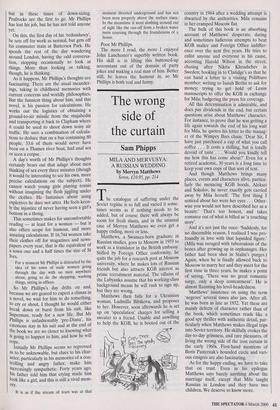The wrong side of the curtain
Sam Phipps
MILA AND MERVUSYA: A RUSSIAN WEDDING by Mervyn Matthews Seren, £10.95, pp. 214 he catalogue of suffering under the Soviet regime is so full and varied it some- times seems as if nothing needs to be added, but of course there will always be room for fresh slants, and in the unusual case of Mervyn Matthews we even get a happy ending, more or less. Matthews, a Swansea-born graduate in Russian studies, goes to Moscow in 1959 to work as a translator in the British embassy. Stifled by Foreign Office conformity, he quits the job for a research post at Moscow university, where he makes lots of Russian friends but also attracts KGB interest as prime recruitment material. The villains of the Lubyanka assume that his working-class background means he will rush to sign up, but they are wrong. Matthews then falls for a Ukrainian woman, Ludmilla Bibikova, and proposes to her. However, soon afterwards he is set up on 'speculation' charges for selling a sweater to a friend. Unable and unwilling to help the KGB, he is booted out of the
T
country in 1964 after a wedding attempt is thwarted by the authorities. Mila remains in her cramped Moscow flat.
The bulk of this book is an absorbing account of Matthews' desperate, daring and sometimes ludicrous attempts to beat KGB malice and Foreign Office indiffer- ence over the next five years. He tries to enlist anyone and everyone in his cause, accosting Harold Wilson in the street; chasing after Nikita Khrushchev in Sweden; booking in to Claridge's so that he can hand a letter to a visiting Politburo member; writing to Isaiah Berlin to ask for money; trying to get hold of Lenin manuscripts to offer the KGB in exchange for Mila; badgering the press for coverage.
All this determination is admirable, and does pay dividends in the end, but certain questions arise about Matthews' character. For instance, to prove that he was getting a life again towards the end of his long wait for Mila, he quotes his letter to the manag- er of the Wimpey Bars chain: 'Dear Sir, I have just purchased a cup of what you call coffee . . . It costs a shilling, but is totally devoid of taste . . Would you kindly tell me how this has come about?' Even for a retired academic, 30 years is a long time to keep your own copy of that sort of text.
And though Matthews brings many places, events and characters alive, particu- larly the menacing KGB hoods, Aleksei and Sokolov, he never exactly gets carried away by Mila herself. 'The first thing I noticed about her were her eyes . . . Other- wise you would not have described her as a beauty.' That's too honest, and takes romance out of what is billed as 'a touching story'.
And it's not just the once: 'Suddenly, for no discernible reason, I realised I was pro- foundly in love with that lopsided figure.' (Mila was ravaged with tuberculosis of the bones after growing up in orphanages. Her father had been shot in Stalin's purges.) Again, when he is finally allowed back to Moscow to marry her and they meet for the first time in three years, he makes a point of saying, 'There was no great romantic surge, only a deep contentment'. He is almost flaunting his level-headedness.
Matthews' insistence on using the term `negroes' several times also jars. After all, he was born as late as 1932. Yet these are mainly defects of character rather than of the book, which sometimes reads like a good spy thriller with authentic detail, par- ticularly when Matthews makes illegal trips into Soviet territory. He skilfully evokes the day-to-day grimness, and rare pleasures, of living the wrong side of the iron curtain in the early 1960s. First-hand mentions of Boris Pasternak's hounded circle and vari- ous émigrés are also fascinating.
As for the happy ending, we have to take that on trust. Even in his epilogue Matthews says barely anything about the marriage itself, except that Mila taught Russian in London and they have two children. We deserve to know more.


































































 Previous page
Previous page